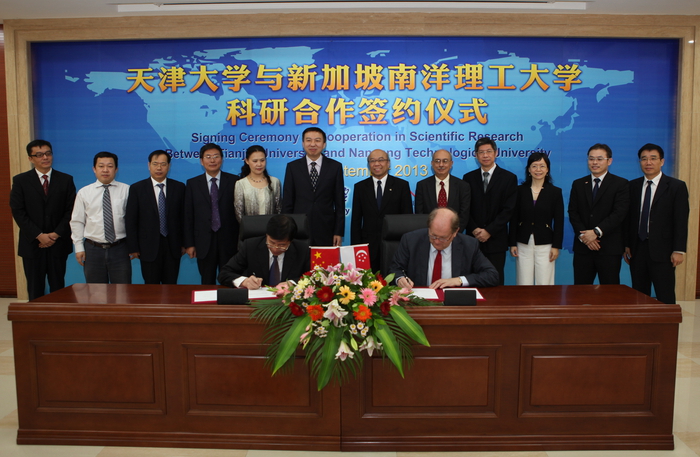TJU-NTU Agreement on Research Collaboration Signed at TJU
2013-10-08

On September 23, 2013, Tianjin University (TJU) and Nanyang Technological University (NTJU), Singapore, which is globally acknowledged as one of the most distinguished engineering universities, signed an Agreement on Research Collaboration at the Scientific Library of TJU. With their complementary advantages, both universities will push forward the cooperation in training students, scientific research, as well as faculty and student exchange.
Attendees of the meeting included NTJU President, Professor Bertil Andersson, Vice President, Professor Er Meng Hwa, and TJU President Li Jiajun as well as Vice President Shu Gequn. Representatives from the Tianjin Municipal Education Commission and TJU associated schools and departments also attended the event.
Professor Li Jiajun presented an overview of TJU’s disciplines, history, achievements in scientific research, and the construction of the new campus. President Andersson talked about the latest ranking of NTJU in Asia and the world. He also expressed his recognition of the achievements of TJU. Subsequently, the presidents exchanged their views on the Sino-Singapore Tianjin Eco-city (SSTEC), recruitment of international faculty, summer schools, and research collaboration with enterprises.
According to the TJU-NTJU Agreement on Research Collaboration, based on the strong encouragement and support from the Tianjin Municipal Education Commission, the universities agreed to establish three virtual centers in the areas of environmental science and engineering, new media, and business case writing. Also, the two universities will collaborate in research, jointly promote the commercialization of scientific achievement, and the exchange of researchers as well as graduate students, to serve the regional economic development of SSTEC, Binhai New Area, and the City of Tianjin. This collaboration will form the foundation of the establishment of the TJU-NTJU joint research institute and deepen educational and research collaborations between China and Singapore.
The three virtual centers established include the Joint Center for Sustainable Water Management, the Digital Media Engineering Center, and China Business Case Centre. The Joint Center for Sustainable Water Management will target at a strategic alliance of innovation in developing eco-friendly technology supported by the government, led by enterprises, and involving universities and research institutes so as to integrate the advantages of all parties. Additionally, goals include attracting world renowned experts, tackling key technological barriers to improving water quality by constructing water ecosystem, and restoring healthy soil , and so on so that qualified talents will be trained, and strong research teams will be formed Upon completion, it will become a world-class R&D and technology promotion platform of ecological and environmental engineering with both engineering technology innovation capabilities and original innovation capabilities. This will help increase China’s international competitiveness in core technologies of eco-friendly industries. At the same time, it will bring together high-level professionals specialized in R&D, promotion and application of eco-friendly technologies, and form an innovative research teams with global impact. It will spawn a series of technological achievements with independent intellectual property, incubate a group of vigorous eco-friendly industries,and promote the harmonious development of man and nature.
Based on the public service platform of the National Animation Industry Park at SSTEC, the Digital Media Engineering Center will focus on applications of 3D animation, game engine development, and film and television animation production.
Case study is an important part of management or business education, and a successful case is also an important achievement in academic and curriculum development in the area of management. With successful experience on case writing at Nanyang Business School, the China Business Case Centre set up a case study database, taking Chinese enterprises as the core units to demonstrate cases of success and failure of different types, using the core unit of China’s economic development, enterprise, as the object, summarizing the success or failure of different types of enterprises. This will have great significance to China’s management education and will be become an important platform of case study, and cooperation with enterprises.
During their visit, the delegation visited the TJU History Museum and MEMS Laboratory accompanied by Vice President Shu.
For years, TJU and NTJU have been carrying out substantive international cooperation in teaching, scientific research, and exchange of faculty and students. Since 2013, both sides have conducted many high-level consultations for the implementation of cooperative programs step-by-step. On February 27, 2013, represemtatives from TJU took part in a delegation from Tianjin municipal government, led by Ms. Zhu Liping, Member of the Standing Committee of the Tianjin Municipal Committee and Party Secretary of the Education Working Committee of Tianjin Municipal Committee,and visited NTJU to discuss research collaboration with the aim of establishing of a joint research institute at SSTEC and in the area of water resources. Also, TJU set up a working committee for the proposed joint research institute between TJU and NTJU with TJU Vice President Shu as the head. On March 22, 2013, Vice President Shu led a delegation to NTJU and had an in-depth discussion with NTJU Vice President Er to further promote the substantive work. Vice President Er led NUT delegations visited TJU subsequently to further implement the details.
NTJU is an internationally reputed research-intensive university in Singapore in the area of engineering. It is also one of the most prestigious universities in Asia. In the QS Asia University Rankings 2013, NTJU is ranked No.10. The cooperation between TJU and NTJU started over a decade ago on various pursuits.
